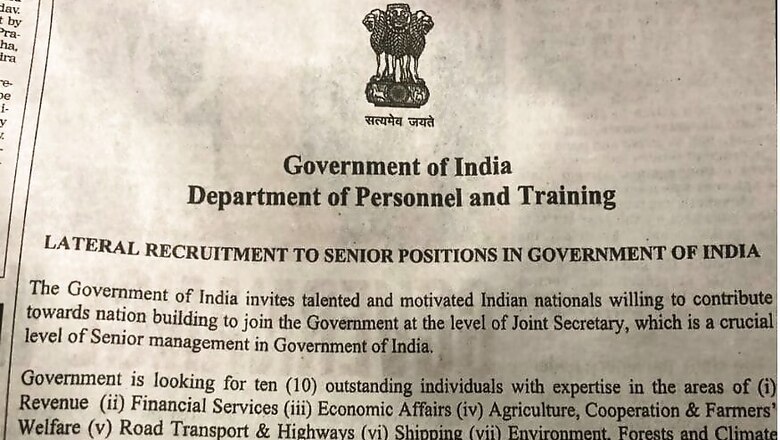
views
This is an age-old debate, and never fully settled.
The first page of Indira Gandhi's premiership saw this debate climb to its pitch. Should technical ministries be headed by the ever-present IAS, or should they be stewarded by doctors and engineers, as infrastructural development became speedy and multi-faceted?
Some chief ministers did tinker to make bold such appointments, but they were quite few. In the Centre, four famous corporate honchos (V Krishnamurthy, Lovraj Kumar, Mantosh Sindhi and Wadud Yar Khan) were directly made secretaries. While their selection was made then by the direct diktat of the Prime Minister’s Office (PMO), it must be conceded that all four distinguished themselves without a turf battle with the UPSC-recruited entrenched bureaucracy.
But nonetheless such direct selections to post of secretaries in the Government of India (from the open market) and in state governments (from technocrats) were never repeated thereafter. Later the Rajiv Gandhi and Narasimha Rao regimes did make open market selections to chairmanships of PSUs (eg ITDC and Air India). But the Vajpayee and Manmohan Singh regimes made no such appointments for 16 years!
Classically, bureaucracies are recruited, nurtured and work under a complex system of rules and regulations balanced by an equally complex weaving of checks and balances. This was conceptualised by Max Weber, whose definitions remained the benchmarks for measuring the neutrality content of any particular bureaucracy. But all this was when the State had three principal objectives: security of the citizen and nation, collection of taxes, and budgeting to then spend the money so collected, all this in the public interest.
But as the State's role became increasingly complex due to speedy technological advances of both capitalistic West as well as Socialist Soviet Union and China et al, as the equally speedy political emancipation of poverty-ridden and backward Afro-Asia, it became painfully clear that a bureaucracy which is thankfully rule-bound yet painfully unaccountable would ultimately behave as if the rules are an end in themselves in such a rigid fashion that they cannot be changed for the better.
In India, both democracy and bureaucracy are not only intertwined but also born out of a Weberian weave of rules. But not only has this woven web at times become rigidly knotted, but the democratic neta manages to break it too, sometimes in the public interest and sometimes in the private interest too. This contradiction leads the bureaucrat to take shelter in a cocoon of rules. A certain lethargy coupled with resistance takes over. "Take no decisions and you will make no mistakes to account for" sometimes does become the work-philosophy.
In principle, thus the experiment to make lateral-entry at Joint Secretary level should be given a fair trial. But it will be a big challenge, full of pitfalls.
Firstly, the selection process must be fair and above board. There must be no room whatsoever for nepotism, which in the Indian context is crucial.
Secondly, the committee itself must be broad-based in all respects, with each member so distinguished in her field that recommendations are readily accepted.
Thirdly, the play field in which these lateral entrants will find themselves must be well-defined so that their accountability is easily measured. Fourthly, successful specialists must be chosen for each post.
Finally, as the duty of the Opposition is to oppose, the issue that they have flagged (that selections should be merit-based and not party-ideologically-inspired) would hopefully guide the selection committee findings.
(Alok Sinha has spent 35 years in the IAS and is now serving as a member of the Supreme Court's Orissa Claims Commission. Views are personal)


















Comments
0 comment